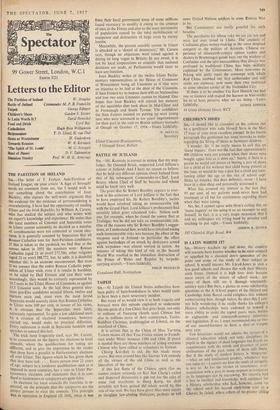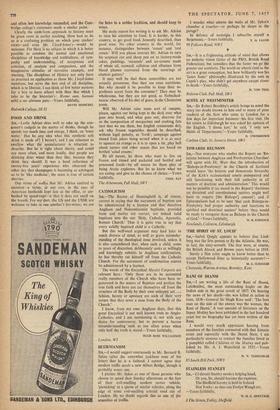IS LATIN WORTH IT?
SIR,—History teachers up and doWn the country will scarcely have known whether to: be most amused or appalled by a classical don's ignorance of • the point and scope of the study of their subject at school. It would interest Mr. Lloyd-Jones to visit a few good schools and discuss this with their History sixth forms. (Indeed it is high time dons becanie more aware of the nature of school work : too many . of them still see it through nineteenth- century eyes.) But then, a glance at some scholarship questions or the A /S-level papers of the Oitford and Cambridge Joint Board could enlighten him without embarrassing him, though before he does this I can- not help wondering if he really thinks his college's History • scholarships were endowed to reward a mere ability to recite the rcgnal years, wars, battles or eighteenth- and nineteenth-century ministries
• and legislation. If so, I must recommend one or two of our second-formers to have a shot at Corpus next year. Few historians would not admire the virtues of a its pupils 'education which not 'only disciplines ts
pupils in the rigours of dead languages but breeds an acquaintance with the minds and practices of great civilisations of the past, some of them still lively. But if the study of modern history is 'dangerous' —what an odd intellectual prudery, whicheVer way one takes it !-1 cannot sec how the study of antiquity is less so. As for the virtues of remoteness, over- association with a past in many respects as irrelevant as its languages can be narrowing. We recently had a boy in intellect and knowledge well equipped for a History scholarship who had, however, come up the school until his second • sixth-form year as a Classic; he failed, where others of no greater ability
and often less knowledge succeeded, and the Cam- bridge college's comments made a similar point.
Clearly the sixth-form approach to history must be given roots in earlier teaching. How best to do so is a confusing problem on which your readers' views—and even Mr. Lloyd-Jones's—would be welcome. For there is no subject in which it is better possible to combine the mental and emotional disciplines of knowledge and truthfulness, of sym- pathy and understanding, of acceptance and criticism, of analysis and comparison, and the imaginative stimulus of narrative example, and warning. The disciplines of History not only have as practical an application as those Mr. Lloyd-Jones mentions, but serve the best end, of all discipline, which is to liberate. I can think of few better mottoes for a boy to leave school with than that which I take to be the historian's: Homo sum, humani nihil a me alien= puto.—Yours faithfully,
DAVID HENSCHEL Dulwich College, SE 21



































 Previous page
Previous page